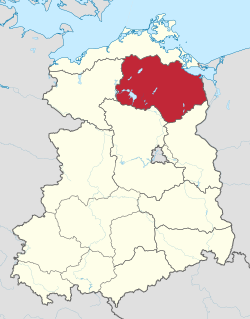| District of Neubrandenburg Bezirk Neubrandenburg | |||||||||||||
|---|---|---|---|---|---|---|---|---|---|---|---|---|---|
| District (Bezirk) of East Germany | |||||||||||||
| 1952–1990 | |||||||||||||
 Location of Bezirk Neubrandenburg within the German Democratic Republic | |||||||||||||
| Capital | Neubrandenburg | ||||||||||||
| Area | |||||||||||||
• 1989 | 10,948 km2 (4,227 sq mi) | ||||||||||||
| Population | |||||||||||||
• 1989 | 620,500 | ||||||||||||
| Government | |||||||||||||
| SED First Secretary | |||||||||||||
• 1952–1953 | Willi Wiebershausen | ||||||||||||
• 1953–1960 | Max Steffen | ||||||||||||
• 1960–1963 | Georg Ewald | ||||||||||||
• 1963–1989 | Johannes Chemnitzer | ||||||||||||
• 1989 | Wolfgang Herrmann | ||||||||||||
• 1989–1990 | Jürgen Zelm | ||||||||||||
| Chairman of the Council of the Bezirk | |||||||||||||
• 1952–1953 | Wilhelm Steudte | ||||||||||||
• 1953–1957 | Hans Jendretzky | ||||||||||||
• 1957–1959 | Horst Brasch | ||||||||||||
• 1959–1962 | Kurt Guter | ||||||||||||
• 1962–1967 | Lothar Geissler | ||||||||||||
• 1967–1972 | Adolf Garling | ||||||||||||
• 1972–1977 | Gottfried Sperling | ||||||||||||
• 1977–1990 | Heinz Simkowski | ||||||||||||
• 1990 | Wolfgang Otto (acting) | ||||||||||||
• 1990 | Martin Brick (as Regierungsbevollmächtigter) | ||||||||||||
| History | |||||||||||||
• Established | 1952 | ||||||||||||
• Disestablished | 1990 | ||||||||||||
| |||||||||||||
| Today part of | Germany | ||||||||||||
The Bezirk Neubrandenburg was a district (Bezirk) of East Germany. The administrative seat and the main town was Neubrandenburg.

